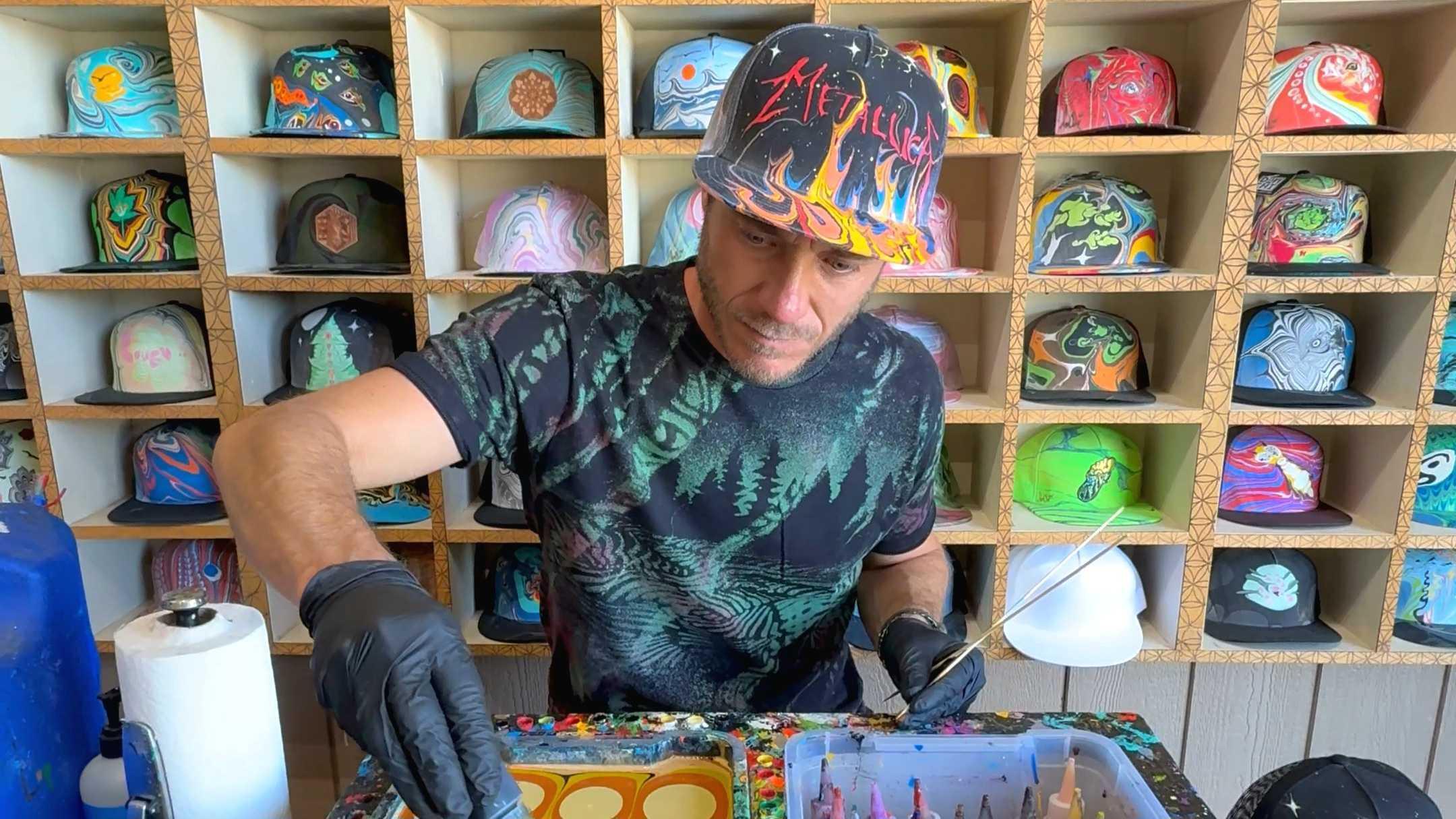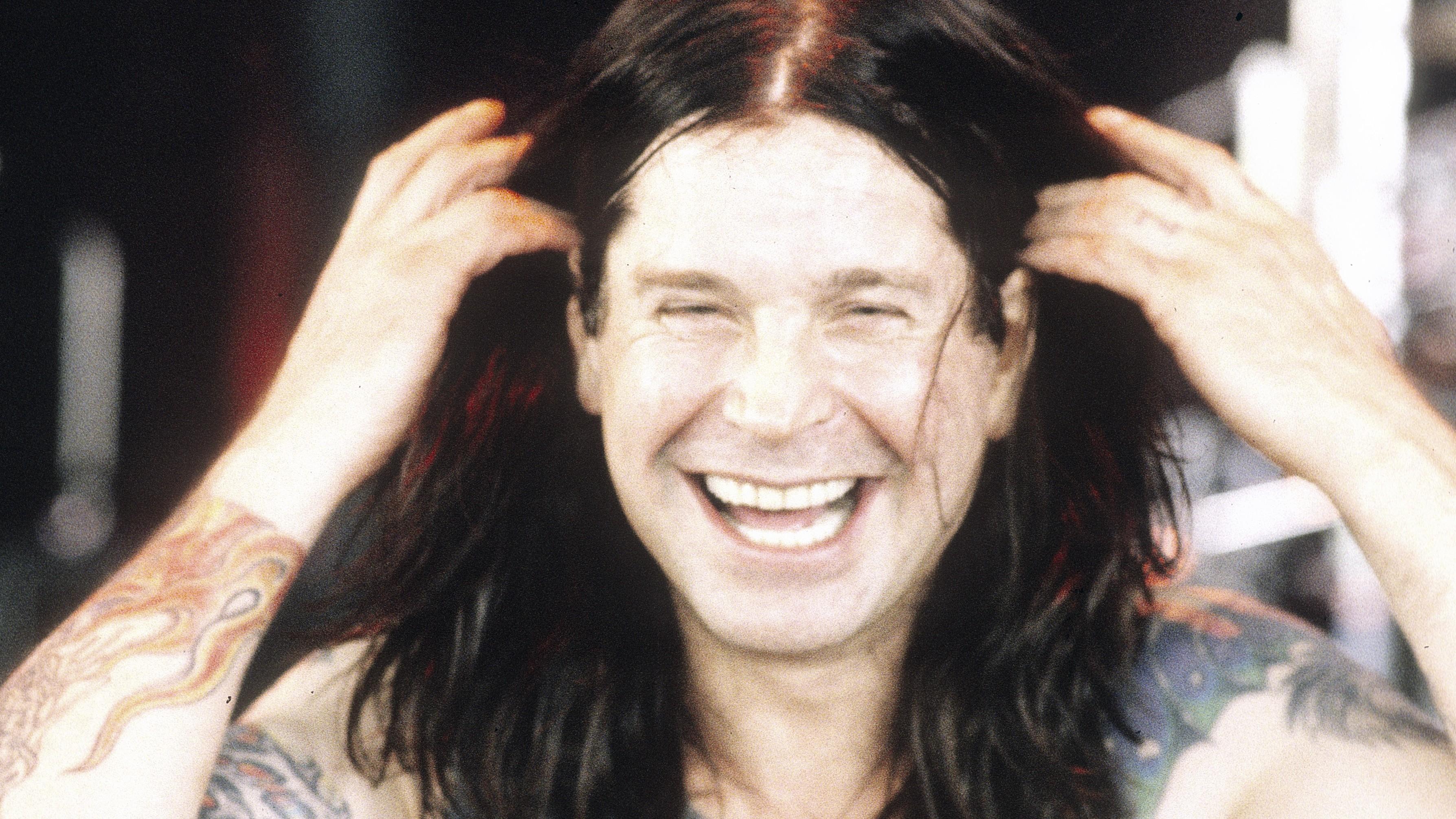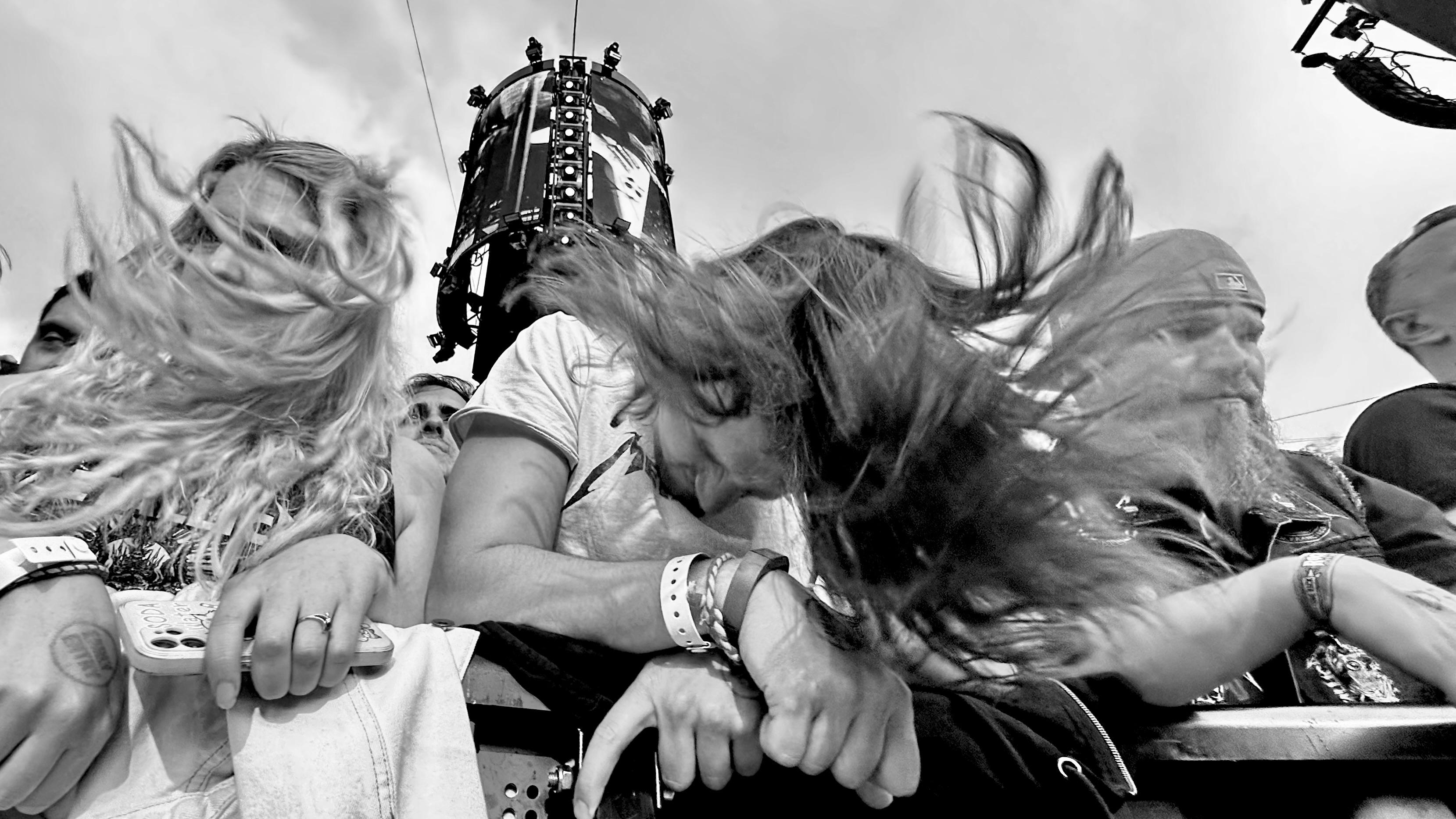
Renaissance Man
Dominic Padua (aka Dom Chi) does many things very well, including the art of marbling. Steffan Chirazi visits his Sebastopol, CA, studio to learn more.
Sep 21, 2021
BY STEFFAN CHIRAZI
One of the most influential and important singers/frontmen in modern music, Dave Gahan of Depeche Mode might not seem as though he’d have much in common with Metallica or James Hetfield, but you’d do well to think again. In fact, Gahan’s brilliant, lo-fi, haunting take on “Nothing Else Matters” is one of the most intriguing and engaging renditions on The Metallica Blacklist, and he was happy to discuss how it came about with So What! After exchanging some laughs with the amiable Gahan over how “the cloud” now stores everything (and thus how folks of our vintage are terrified every time we update a phone) we quickly got to the business of discussing how his stirring interpretation came about.
Steffan Chirazi: We are frightening any potential viewers or readers with our commentary on technology, but the irony is that, over the years, musically you and Depeche Mode utilized technology as well as anyone did. So kids, don’t be fooled. He knows what he’s talking about.
Dave Gahan: Someone told me this once: use the technology, and don’t let it use you. Very important.
SC: So true. And trust it because if you don’t, again, you’ll drive yourself down a rabbit hole.
Anyway, first of all, I love the version. It has airs of the electronic eras that you’ve gone into, the deeper ones. But I also heard elements of the KLF (British ambient band) in there as well, that kind of approach, where there’s little sounds wrapping around the corners in the background behind your vocals. But before we get into your recording, when was the first time that you were aware of both The Black Album and “Nothing Else Matters” in particular?
DG: Oh, thank you. Well, when this record came out, I was living in Los Angeles, and myself and my band were probably… I think we were taking a little bit of a break maybe for the first time in, I don’t know, 12 years or something. And having a lot of fun in LA. My band and Metallica, we both reached this point where we were, I don’t know, we’d suddenly just kind of hit the top of the mountain and it was like, okay, this is the end of the first period of the band… and now what are we going to do? This record is kind of like that I think for Metallica, and we also had that record. And that tour that followed it, where you’re on the road for nearly two years and then it becomes, “I’ve got to go home.” It’s like, I don’t even know what that [home] is anymore and I think we have that in common.
The song itself was iconic for Metallica and Metallica fans, and I’m sure it’s a staple in their set. And the thing about it is that it’s an unusual song for them. When you dig deep into the song, which I did, it’s a very intimate, personal song. It’s not your usual sing-along, “let’s rock” type song either; I wanted to pull that out of it. I wanted to go down a very sort of cinematic sort of approach with it.
It was in the middle of Covid I was asked to do this, I hadn’t been doing anything, I didn’t want to do anything, and I started listening to this record again. And this song was the one that kept leaping out to me, and I was lucky enough to get the chance to do it. So yeah, I wanted to turn it on its head, and I wanted it to become a much more intimate, one-on-one, stuck in a box type of feeling. But at the same time, to have a kind of cinematic backdrop.
It was recorded here in New York with Adrian [Hierholzer], my friend right here, and he did my vocals for me, [the cello was by Gyda Valtysdottir of the band Mum in Brooklyn, NY, while the guitar was recorded by Peter Hayes from Black Rebel Motorcycle Club in LA – ED]. Then a lot of the stuff [keyboards, production, and mixing – ED] was done over in Iceland with my friend Kurt Uenala, and we created this backdrop for the song that, to me, complements how good the song is.
SC: I’d like to acknowledge for our readers, the Depeche Mode album Dave referenced is Violator, which was an enormous record and tour. It was enormous, and it’s interesting that you point out there were very similar moments in each of your careers, it was that stratospheric level. And LA was a strange place back then.
DG: It was a lot of fun too and the music scene was changing. You know, your Jane’s Addiction was coming up, Soundgarden and Nirvana, and it was all these bands playing in these little clubs on the Strip and off the Strip, so it was a fun place to be when that was happening. We were stuck in the middle of that, and so probably were Metallica, who had also had a steady rhythm in what they were doing in their touring, in their albums, how many records they sold, and then suddenly they made this album. And it went through the roof. The same happened with us and Violator. We made Violator and had no idea what was going to happen after that. It went through the roof, and we backed it up with Songs of Faith and Devotion, and then went on the road for the next, you know, 18 months.
SC: So, I’m not sure if anyone’s told you, but James was the principal person who asked if you could be involved in this project. Quite simply he likes your work and I think was really interested to see what would happen. But it’s interesting that you zeroed in on finding a very, very intimate channel in the song. I think it’s become – and meant – different things over the years, as songs tend to do to their writers. If you would, talk a little bit about why you wanted to zero in on that sense and what emotions it drew out of you, now, as an artist. I’d love to hear what drew you to this interpretation of that song because it’s quite on point.
DG: Well, thank you. It took a little bit of doing. First of all, I was in my house, playing a bit of guitar, plugged into my amp, and strapped my black Gretsch on. And I have fun playing along to the Stones – playing along to Exile on Main St. is one of my favorites. Occasionally my wife looks at me, or one of my kids, and they’re like, “Oh, that was cool, Dad.” But most of the time it’s just “shut up,” you know. But I get lost in it. So that’s the first thing I did: put the guitar on and I just started playing The Black Album, just chugging along with things, and I kept stopping. You know, you’ve also got this beautiful guitar work as well on the song. And Kirk, the solo is iconic. It’s in that same way that to me – I might get this totally wrong – but to me, it’s like their “Stairway to Heaven” or something. It’s like Zeppelin, they’re rocking along, they’re chugging along, and then suddenly there’s this very sentimental ballad that could’ve really gone the wrong way. I get pulled into those kinds of sentiments, if it’s done well, and I think Metallica did it very well. My first thought though with it was that, okay, I’ve got to do something very, very different. You know, I can sing balls out, I could do that if I wanted. But it hit me pretty quickly that I had to do something quite different if I was going to do this. It took me a little while, and then I suddenly clicked one day, put the guitar down, and I started singing in a [certain] way. I had this little Fender PA system where I usually warm up my voice, and I started getting closer and closer to the mic, I wanted to really hear the words as if I was talking to somebody, but singing at the same time, and honoring that melody that’s in the song. I was lucky we went down that road where I wanted to do the total opposite, really, of what Metallica were doing with it, but pay great respect and compliment to the song.
SC: Well it’s a super intriguing version, and I think also there’s some very interesting pathways that you and James as songwriters probably share. Let me make that my penultimate question. Did you ever feel, as you were reading the lyrics and getting the transcriptions of the music, did you feel a kinship with him as a writer in any way?
DG: Yeah, well, you know I asked the guys if they could send me a version that would have just James. I wanted just James on there. I didn’t want any backing vocals, I just wanted to hear his raw kind of emotion. And that’s the version! I heard that, I could hear him trying, and I love that about the voice. You can use all these effects and stuff like that, but getting to that raw real soul coming out of your body was what I wanted to do with it.
SC: That’s great. Final question – I wondered, do you have a question for James about the song that you’d like to ask him? Is there anything as you were going through it that you were like, “I wonder what that’s about?”
DG: Yeah, I always wondered what part came first? What was the first thing he heard in his head when he was scribbling on a bit of paper, or heard a little melody that he was playing on a guitar and started mumbling a melody to himself… to that melody or those chords? Because there’s always a part that comes to me first, and then it’s like, can I build a song around this? Or is there a song? He’ll know as a writer.
Dave Gahan’s portion of the profits from The Metallica Blacklist will be donated to World Central Kitchen.
A non-profit founded in 2010 by Chef José Andrés, World Central Kitchen (WCK) uses the power of food to nourish communities and strengthen economies in times of crisis and beyond. WCK has created a new model for disaster response through its work helping devastated communities recover and establish resilient food systems.
WATCH THE MUSIC VIDEO FOR "NOTHING ELSE MATTERS" BY DAVE GAHAN

Dominic Padua (aka Dom Chi) does many things very well, including the art of marbling. Steffan Chirazi visits his Sebastopol, CA, studio to learn more.

What you are diving into here is my personal journal with regards to the Back to the Beginning extravaganza. Much of it was written off-the-cuff, and the sheer magnitude of the event means that even now there are still pieces of “thought” swirling in the ether and making brain fall by the hour. These recollections, emotions, and observations are shared reflectively over three separate entries after the event and are split between an initial “post-event download” and then a more chronological reflection on our time in Birmingham…
